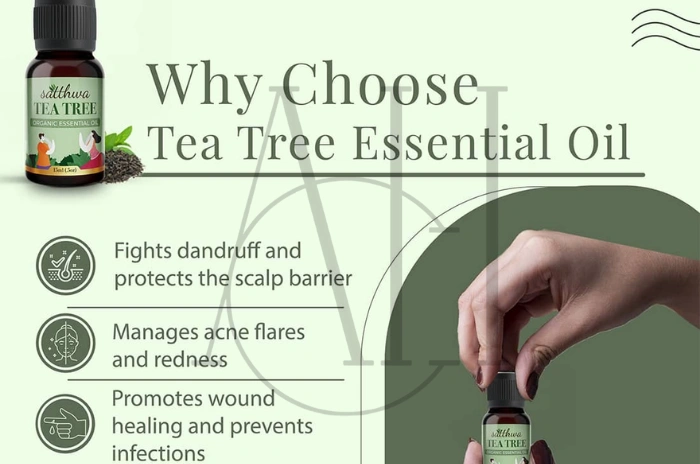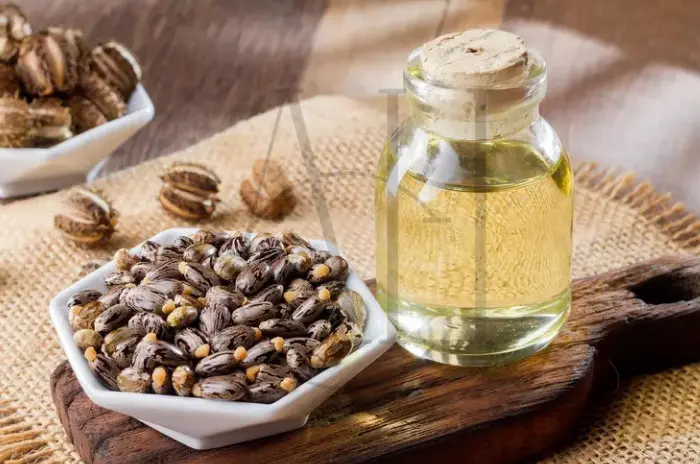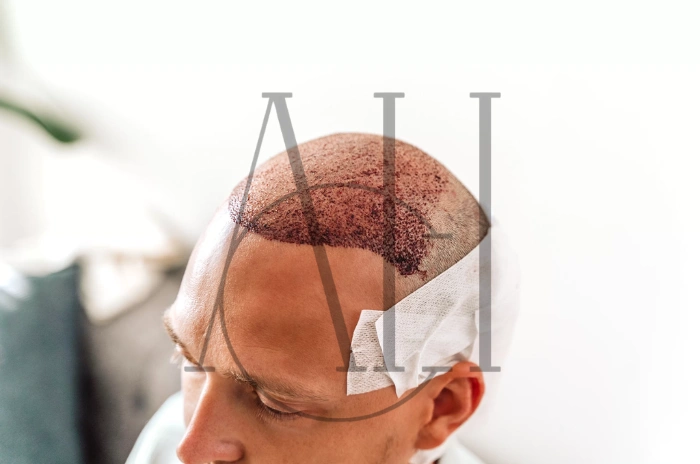Tea tree oil for hair has gained significant popularity in recent years as a natural solution for various scalp and hair concerns. This powerful essential oil, derived from the leaves of the Melaleuca alternifolia plant native to Australia, offers numerous benefits for hair health while also carrying certain risks that users should understand.
Many people turn to tea tree oil benefits for hair when dealing with dandruff, scalp irritation, or hair thinning issues. However, like any potent natural remedy, it’s essential to understand both its therapeutic properties and potential side effects before incorporating it into your hair care routine.
Table of Contents
ToggleWhat tea tree oil is and why it helps hair
Tea tree oil is an essential oil extracted through steam distillation from the leaves of the Australian tea tree plant. This antifungal tea tree oil contains powerful compounds like terpinen-4-ol, which gives it its distinctive antimicrobial and anti-inflammatory properties.
The oil works for hair health by creating an environment on the scalp that’s hostile to harmful bacteria and fungi. Its natural antiseptic properties help maintain tea tree oil scalp health by reducing inflammation and clearing blocked hair follicles that can impede healthy hair growth.
When applied correctly, tea tree oil penetrates the scalp to remove buildup of dead skin cells, excess oil, and environmental pollutants. This cleansing action allows hair follicles to function optimally, potentially supporting stronger and healthier hair growth over time.
The oil’s ability to improve blood circulation to the scalp also contributes to its hair-supporting properties. Better circulation means more nutrients and oxygen reach the hair follicles, creating optimal conditions for hair development.
How Tea Tree Oil Can Support Healthy Hair Growth
Tea tree oil hair growth support occurs through multiple mechanisms that address common barriers to healthy hair development. The oil’s antimicrobial properties help eliminate scalp conditions that can interfere with the normal hair growth cycle.
By maintaining a clean, healthy scalp environment, tea tree oil for hair growth may help extend the anagen (growth) phase of the hair cycle. When follicles are free from bacterial or fungal infections, they can focus their energy on producing strong, healthy hair strands rather than fighting off pathogens.
Research suggests that tea tree oil may help improve hair thickness and reduce hair loss by addressing underlying scalp health issues. While it’s not a miracle cure for genetic hair loss conditions, it can be a valuable supportive treatment when used as part of a comprehensive hair care routine.
Key mechanisms for hair growth support:
- Removes follicle-blocking debris and buildup
- Reduces scalp inflammation that can impede growth
- Improves blood circulation to hair follicles
- Creates an optimal environment for healthy hair development
- May help extend the active growth phase of hair cycles
The oil’s effectiveness for hair growth is most noticeable when scalp health issues are the primary cause of hair problems. Users often report seeing improvements in hair texture, reduced breakage, and potentially increased growth rates after consistent use.
The Benefits of Tea Tree Oil for Your Hair
Tea tree oil benefits for hair extend far beyond simple cleansing. This versatile essential oil addresses multiple hair and scalp concerns simultaneously, making it a valuable addition to many hair care routines.
Tea tree oil for dandruff is perhaps its most well-known application. The oil’s antifungal properties specifically target Malassezia, the yeast that contributes to dandruff formation. Regular use can significantly reduce flaking, itching, and scalp irritation associated with this common condition.
For those dealing with tea tree oil for head lice, this natural remedy offers a chemical-free alternative to conventional treatments. Studies have shown that tea tree oil can effectively kill lice and their eggs when used in appropriate concentrations.
Additional hair benefits include:
- Scalp cleansing: Removes excess oil and product buildup
- Itch relief: Soothes irritated, itchy scalp conditions
- Hair strength: May help reduce breakage by improving scalp health
- Natural conditioning: Adds shine and softness to hair strands
- Odor control: Eliminates scalp odors caused by bacterial overgrowth
Tea tree oil shampoo products combine these benefits with gentle cleansing agents, making it easier to incorporate the oil’s therapeutic properties into regular hair washing routines. These formulations typically contain diluted tea tree oil in safe concentrations for regular use.
Potential Risks and Side Effects of Tea Tree Oil
Understanding tea tree oil risks and warnings is crucial for safe and effective use. While generally considered safe when properly diluted and applied, tea tree oil can cause adverse reactions in some individuals.
Tea tree oil allergic reaction symptoms can range from mild skin irritation to severe contact dermatitis. Common signs include redness, itching, burning sensation, and swelling at the application site. In rare cases, more severe reactions may occur.
The most important safety consideration is that tea tree oil should never be applied undiluted to the skin or scalp. Pure tea tree oil is highly concentrated and can cause chemical burns, severe irritation, and sensitization reactions.
Common side effects and risks:
- Contact dermatitis: Skin inflammation and rash
- Allergic sensitization: Increased sensitivity with repeated exposure
- Scalp dryness: Over-use can strip natural oils
- Hair color fading: May affect chemically treated hair
- Eye irritation: If accidentally contacted with eyes
Patch test tea tree oil before first use is essential. Apply a small amount of properly diluted oil to a discreet area of skin and wait 24-48 hours to check for any adverse reactions.
Pregnant and breastfeeding women should consult healthcare providers before using tea tree oil products. Children under two years of age should not be exposed to tea tree oil applications.

How to Choose the Best Tea Tree Oil Product
Selecting quality tea tree oil for hair products requires understanding key factors that indicate purity, potency, and safety. Not all tea tree oil products are created equal, and choosing the right one can make the difference between beneficial results and potential problems.
Look for 100% pure, therapeutic-grade tea tree oil that has been steam-distilled. The oil should be packaged in dark glass bottles to protect it from light degradation. Quality products will clearly state the botanical name (Melaleuca alternifolia) and country of origin.
How to use tea tree oil for hair safely starts with proper dilution. Never apply undiluted tea tree oil directly to your scalp or hair. The recommended dilution ratio is typically 2-5% tea tree oil mixed with a carrier oil or shampoo.
Recommended carrier oils for dilution:
- Almond oil carrier for tea tree oil: Light, easily absorbed
- Coconut oil: Antimicrobial properties complement tea tree oil
- Jojoba oil: Closely mimics natural scalp sebum
- Olive oil: Deeply moisturizing and readily available
When purchasing tea tree oil shampoo, look for products that contain 1-5% tea tree oil concentration. Higher concentrations increase the risk of irritation without necessarily providing additional benefits.
Quality indicators include third-party testing certificates, clear labeling of active ingredients, and reputable manufacturer credentials. Avoid products with artificial fragrances or colors that could interfere with the oil’s natural properties.
Why Tea Tree Oil Is Good for Curly Hair
Tea tree oil for scalp health is particularly beneficial for individuals with curly hair textures. Curly hair structures naturally trap oils, dead skin cells, and styling products closer to the scalp, creating conditions that can lead to buildup and irritation.
The unique structure of curly hair makes it more prone to dryness, as natural oils have difficulty traveling down the curved hair shaft. This can lead to an oily scalp combined with dry hair ends, a condition that tea tree oil benefits for hair can help address.
Tea tree oil’s clarifying properties help remove buildup without over-stripping the hair, which is crucial for maintaining the delicate moisture balance that curly hair requires. Its anti-inflammatory effects can soothe scalp irritation often experienced by those with tightly coiled hair textures.
Specific benefits for curly hair:
- Buildup removal: Clears product accumulation in hair curves
- Scalp balance: Addresses oily roots without drying hair lengths
- Curl definition: Clean, healthy scalp promotes better curl formation
- Reduced manipulation: Less need for harsh clarifying treatments
The oil’s antimicrobial properties are especially valuable for protective styles common in curly hair care, where hair may be manipulated less frequently, allowing bacteria or fungi to accumulate.
Who should avoid tea tree oil and how often to use it
Certain individuals should exercise extra caution or completely avoid using tea tree oil for hair products. Understanding these contraindications is essential for safe use and preventing adverse reactions.
People with sensitive skin, eczema, or a history of contact allergies should approach tea tree oil with particular caution. Those with hormonal sensitivities should also consult healthcare providers, as some studies suggest tea tree oil may have mild hormonal effects.
Tea tree oil and hair loss concerns arise when the oil is used too frequently or in concentrations that are too high. Over-use can lead to scalp irritation and inflammation that may actually impede healthy hair growth.
Frequency guidelines for safe use:
- Beginners: Start with once weekly application
- Sensitive scalp: Every 2-3 weeks maximum
- Normal scalp: 1-2 times per week
- Oily/problematic scalp: Up to 3 times per week
Always dilute tea tree oil with carrier oil rather than using it neat. The standard dilution for scalp application is 2-3 drops of tea tree oil per tablespoon of carrier oil.
Individuals taking medications, those with compromised immune systems, and anyone with a history of essential oil allergies should consult healthcare professionals before beginning tea tree oil treatments.
FAQ :Tea Tree Oil for Hair Growth and Side Effects
How can you safely apply tea tree oil on hair?
Always dilute tea tree oil with a carrier oil like coconut or jojoba oil at a 2-3% concentration before applying to your scalp and hair.
What does tea tree oil do for hair?
Tea tree oil for hair cleanses the scalp, reduces dandruff, fights fungal infections, and may support healthy hair growth by creating optimal scalp conditions.
Does tea tree oil help with hair growth?
Tea tree oil hair growth support works by maintaining scalp health, reducing inflammation, and clearing blocked follicles, which may indirectly promote better hair growth.
Can I leave tea tree oil in hair overnight?
Only properly diluted tea tree oil should be left in hair overnight, and it’s recommended to do a patch test first to ensure no allergic reactions occur.




